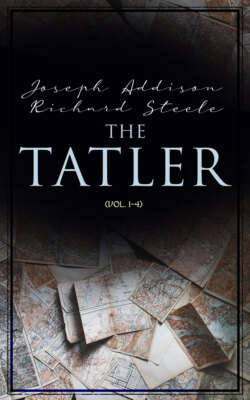Читать книгу The Tatler (Vol. 1-4) - Joseph Addison - Страница 153
From my own Apartment, July 11.
ОглавлениеThis evening some ladies came to visit my sister Jenny; and the discourse, after very many frivolous and public matters, turned upon the main point among the women, the passion of love.395 Sappho, who always leads on this occasion, began to show her reading, and told us, that Sir John Suckling and Milton had, upon a parallel occasion, said the tenderest things she had ever read. "The circumstance," said she, "is such as gives us a notion of that protecting part which is the duty of men in their honourable designs upon, or possession of, women. In Suckling's tragedy of 'Brennoralt' he makes the lover steal into his mistress's bedchamber, and draw the curtains; then, when his heart is full of her charms, as she lies sleeping, instead of being carried away by the violence of his desires into thoughts of a warmer nature, sleep, which is the image of death, gives this generous lover reflections of a different kind, which regard rather her safety than his own passion. For, beholding her as she lies sleeping, he utters these words:
"So misers look upon their gold,
Which, while they joy to see, they fear to lose:
The pleasure of the sight scarce equalling
The jealousy of being dispossessed by others.
Her face is like the Milky Way i' th' sky,
A meeting of gentle lights without name!
"Heavens I shall this fresh ornament of the world,
These precious love-lines, pass with other common things
Amongst the wastes of time? what pity 'twere!396
"When Milton makes Adam leaning on his arm, beholding Eve, and lying in the contemplation of her beauty, he describes the utmost tenderness and guardian affection in one word:
"Adam with looks of cordial love
Hung over her enamoured.397
"This is that sort of passion which truly deserves the name of 'love,' and has something more generous than friendship itself; for it has a constant care of the object beloved, abstracted from its own interests in the possession of it." Sappho was proceeding on the subject, when my sister produced a letter sent to her in the time of my absence, in celebration of the marriage state, which is the condition wherein only this sort of passion reigns in full authority. The epistle is as follows:
"DEAR MADAM,
"Your brother being absent, I dare take the liberty of writing to you my thoughts of that state, which our whole sex either is or desires to be in: you'll easily guess I mean matrimony, which I hear so much decried, that it was with no small labour I maintained my ground against two opponents; but, as your brother observed of Socrates, I drew them into my conclusion from their own concessions; thus:
"In marriage are two happy things allowed,
A wife in wedding-sheets, and in a shroud.
How can a marriage state then be accursed,
Since the last day's as happy as the first?
"If you think they were too easily confuted, you may conclude them not of the first sense, by their talking against marriage.
"Yours,
"MARIANA."
I observed Sappho began to redden at this epistle; and turning to a lady, who was playing with a dog she was so fond of as to carry him abroad with her; "Nay," says she, "I cannot blame the men if they have mean ideas of our souls and affections, and wonder so many are brought to take us for companions for life, when they see our endearments so triflingly placed: for, to my knowledge, Mr. Truman would give half his estate for half the affection you have shown to that Shock: nor do I believe you would be ashamed to confess, that I saw you cry, when he had the colic last week with lapping sour milk. What more could you do for your lover himself?" "What more!" replied the lady, "there is not a man in England for whom I could lament half so much." Then she stifled the animal with kisses, and called him, Beau, Life, Dear, Monsieur, Pretty Fellow, and what not, in the hurry of her impertinence. Sappho rose up; as she always does at anything she observes done, which discovers in her own sex a levity of mind, which renders them inconsiderable in the opinion of others.
